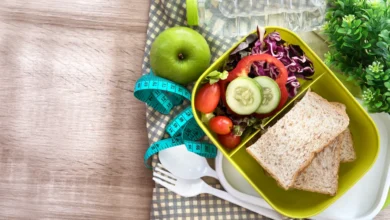Starting your baby on solid foods is one of the most anticipated milestones in their first year of life. After months of exclusive breast or bottle feeding, the idea of your little one tasting new flavours, textures, and eventually sharing family meals is exciting, and maybe a bit overwhelming. You might be hoping solids will bring more sleep, fuller bellies, and fewer frequent feeds. Or perhaps you simply can’t wait to witness the adorable reactions as your baby experiences a spoonful of mashed banana or pureed sweet potato for the first time.
Whatever your expectations are, it’s important to know that this journey is often full of surprises. You may have read all the guides and feel fully prepped, but no one can predict exactly how your baby will respond to this new chapter. One thing is for sure: things will change. Here’s a detailed look at what you can expect once solids start making their way into your baby’s life.
1. You’ll Be Greeted with Unimpressed Faces (and Lots of Them)
Despite your best culinary efforts and enthusiasm, your baby’s first bites of food may be met with blank stares, grimaces, or even outright rejection. This isn’t necessarily because your carefully mashed peas are offensive—it’s just that everything is new. The texture, temperature, and method of delivery (a spoon instead of a nipple) are all strange for your baby.
It can take up to 10–20 exposures to the same food before a baby accepts it. So, don’t worry if your little one turns up their nose at something on the first try. The key is gentle persistence. Keep offering the same foods on different days and in different combinations. Over time, your baby will become more accustomed to the sensations of eating and begin to develop preferences.

2. Prepare for an Epic Mess
If you’re a fan of clean kitchens and tidy highchairs, brace yourself. Starting solids is a messy endeavour. From squished banana stuck in their hair to bright orange pumpkin smudged across the tray (and your walls), chaos is inevitable. Your baby is not just learning to eat—they’re exploring food with all five senses, especially touch.
To manage the mess, dress your baby in an easy-to-clean bib, use wipeable highchairs, and consider placing a plastic mat or old sheet under the feeding area. If weather permits, take mealtimes outdoors. There’s no shame in hosing everything down after a particularly adventurous meal session!
3. It’s Going to Take Time
Introducing solids is a gradual process, not a switch you flip overnight. It’s completely normal for your baby to start with just a few tiny spoonfuls once a day. Over time, this will increase to two and then three meals a day, along with snacks.
There will be days when your baby eats enthusiastically and others when they turn their head at everything you offer. Appetite fluctuates with teething, sleep, mood, and general development. Let your baby set the pace, and focus on consistency rather than quantity in the early months. It’s all about exposure and building positive associations with food.
4. Mood Will Affect Mealtime
Just like adults, babies are not always in the mood to eat. If your baby is tired, overstimulated, or cranky, trying a new food might not go well. Timing meals when your baby is alert, well-rested, and slightly hungry (but not ravenous) can make the experience smoother.
Watch for signs of interest, like reaching for your food or opening their mouth when you bring a spoon near. Conversely, if your baby is clamping their lips shut or turning their head away, it might be best to skip the feeding and try later. Forcing food when your baby isn’t ready can create stress for both of you.
5. Diaper Changes Will Get More…Interesting
Once solids enter the equation, your baby’s poop will change, significantly. If you’ve been used to the relatively odourless, yellowish output of a breastfed baby, prepare yourself. Solid food brings on thicker, smellier, and more varied bowel movements, often directly reflecting what your baby has eaten. Yes, you’ll see bits of undigested peas or corn. That’s normal.
These changes can also bring about constipation or looser stools as your baby’s digestive system adjusts. Be mindful of introducing new foods gradually and including fibre-rich options like fruits, veggies, and whole grains to keep things moving smoothly.
6. Milk Feeds Will Start to Decrease
As solids become more consistent and meals increase in size, you’ll notice your baby naturally beginning to nurse or bottle-feed less. This doesn’t happen immediately, but typically becomes more evident around 8–10 months of age.
It’s important to remember that breastmilk or formula is still the main source of nutrition until 12 months. Solids are initially complementary, meant to introduce flavours and textures while your baby continues to get most nutrients from milk. If you’re unsure about when to reduce milk feeds, consult your pediatrician or child health nurse to ensure your baby’s nutritional needs are being met.
7. Solids Might Not Help Sleep (Sorry)
A common myth is that starting solids will help your baby sleep longer or through the night. Unfortunately, the reality is often the opposite, especially at the beginning. Introducing new foods can temporarily upset your baby’s digestion, leading to gassiness or discomfort that may disturb sleep.
Since solids start in very small quantities and take time to increase, your baby won’t be going to bed with a full belly just yet. Relying on solids as a solution to sleep issues typically doesn’t yield results. Instead, focus on balanced meals and sleep-friendly routines while your baby adjusts.

8. Gagging Is Normal (but Always Monitor)
Gagging is a natural and expected part of learning to eat. It’s your baby’s way of protecting themselves from choking by moving food back toward the front of the mouth. Although it might look alarming, gagging is different from choking and often doesn’t require intervention.
However, you should always supervise your baby during meals, especially as they transition to lumpier textures or finger foods. Take a baby first aid course if you haven’t already, so you know what to do in case of true choking, which is rare but serious.
9. Your Baby Will (Eventually) Eat What You Eat
By the time your baby reaches 12 months, they should be enjoying a wide variety of foods and joining in family meals. This is an exciting phase, you can offer a modified version of whatever the rest of the household is having. Just avoid added salt, sugar, and choking hazards like whole nuts or hard chunks.
Getting to this point takes time, but once your baby is regularly eating solids, you’ll notice a major shift in your daily routines and family dynamics. Mealtime becomes more interactive, social, and often a lot more fun.
10. Every Baby Takes a Different Path
Perhaps the most important thing to remember is that no two babies are the same. Some take to solids like a duck to water; others take weeks (or months) to warm up. Don’t compare your baby to others or stress if progress seems slow.
Stay flexible, seek guidance when needed, and celebrate the little victories, like the first time your baby swallows a bite or reaches for the spoon on their own. With patience and encouragement, your baby will get there.
The Basics: Why, When, What, and How of Introducing Solids
While knowing what to expect is important, having a solid foundation in the why, when, what, and how of introducing solids is essential.
Why Babies Need Solid Foods
From birth, babies rely on breastmilk or formula for all their nutritional needs. Around 6 months, their iron stores begin to deplete, and they need additional nutrients, particularly iron, that milk alone can’t provide. Solid foods play a vital role in supporting healthy growth, development, and sensory learning.
Introducing solids also helps babies practice the oral motor skills needed for chewing, swallowing, and eventually speaking. Textures, flavours, and even self-feeding build confidence and independence around food.
When to Start Solids
Most babies are ready to start solids around 6 months of age. Look for these signs:
- Can sit upright with minimal support
- Good head and neck control
- Shows interest in food (e.g., watching you eat, reaching for your plate)
- Opens mouth when food is offered
Avoid introducing solids before 4 months, as a baby’s digestive system and oral motor skills are not yet mature.
Best Time of Day to Offer First Solids
Choose a time when your baby is well-rested and calm, typically after a milk feed but not when they’re too full or too hungry. This ensures they’re relaxed and more likely to explore the food positively.
Observe your baby’s cues, they may lean forward, open their mouth, or get excited when they see food. If they turn their head away, push the spoon, or clamp their mouth shut, they’re not interested. Try again later.
How Much to Offer at First
Start small. Just 1–2 teaspoons of a smooth puree once per day is enough at the beginning. Gradually increase the amount and frequency based on your baby’s interest and appetite.
By 9–12 months, most babies are eating three meals a day, plus snacks, in addition to milk feeds.
What Foods to Introduce First
Begin with iron-rich foods such as:
- Iron-fortified baby cereals
- Minced meats, poultry, or fish
- Cooked and mashed eggs
- Cooked tofu and legumes
Add a variety of soft fruits, vegetables, grains, and dairy products:
- Mashed banana, avocado, or pear
- Steamed carrots, sweet potato, or pumpkin
- Soft bread, oats, or cooked rice
- Full-fat yogurt or cheese
Introduce one new food at a time, especially when starting, so you can monitor for any allergic reactions.
Offering Water
Once solids are introduced, offer small sips of cooled, boiled water from a cup. This helps your baby learn to drink from a cup and prevents constipation.
After 12 months, your baby can drink tap water without boiling.

Foods to Avoid
Some foods should be avoided during the first year, including:
- Honey (risk of infant botulism)
- Unpasteurized dairy or raw eggs (risk of bacteria)
- Whole nuts or hard foods (choking hazard)
- Added salt and sugar
- Reduced-fat dairy before age 2
Final Thoughts
Introducing solids is an exciting and messy milestone, full of funny faces, new routines, and learning curves. Don’t stress if things don’t go perfectly, this phase is all about discovery. Stay patient, trust your baby’s cues, and celebrate the joy of watching them grow into a confident little eater.
Every bite is a step toward independence, and before you know it, your baby will be sitting at the table with the rest of the family, spoon in hand, ready for more.



